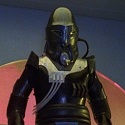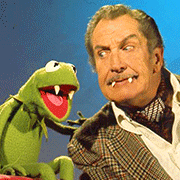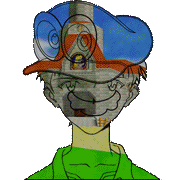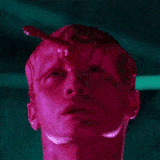|
I have a strange love for D.W. Griffith. He was an incredibly flawed man who clearly saw himself as a moral filmmaker, always taking a grandstand for what he believes is right and overestimating his level of social influence. But he had no consistency nor as clear-eyed a view of the world as he thought he did. In the 1910s he made several short temperance films highlighting the evils of alcohol and siding with the calls for prohibition in a very grandstanding manner. His last film in 1931, The Struggle, of which its box office and critical failure devastated him and finally ended his career, however is also about the evils of alcohol and he does not hesitate for a second to blame it all on prohibition as if 15 years earlier he wasn't a part of the howling crowd calling for an alcohol ban. His work is a collection of very honest social filmmaking coming from an impressionable, flawed person who never truly formed a clear ideology. He was always looking for somebody to blame but when his work is taken as a whole you can tell he mostly blames himself.
|
|
|
|

|
| # ? Apr 26, 2024 01:17 |
|
Laura - Otto Preminger, 1944 A great noir, well shot and full of fun twists and turns. There's a major twist in the middle that I did not see coming. And with pretty much every character being a suspect, it's pretty difficult to predict the outcome. And the ending was very well done. Gene Tierney and Dana Andrews are both good, but it's Clifton Webb and Vincent Price who really steal the show. 402/1000
|
|
|
|
Laura also has a wonderful soundtrack. Definitely one of the best noirs out there.
|
|
|
|
Broadway Danny Rose - Woody Allen, 1984 Although the storytelling framing device feels unnecessary, it's kind of a neat idea. The black and white cinematography looks good, and the story is simple but fun. Allen and Farrow are expectedly great, but Nick Apollo Forte is the big surprise here. Apparently this is his only film role, which is surprising given how good he is. Like with most Allen, I never laughed out loud but I smiled a lot. Not a masterpiece, but typical above-average Allen. The best line: "They shot him in the eyes." "Oh my god he's blind?" "No, he's dead." 403/1000
|
|
|
|
A Song of Love - Jean Genet, 1950 You know that cliched way in which "artsy foreign films" are sometimes lampooned? Usually in French and black and white, with some sort of pretentious symbolism like a flower dying or something? Kinda like Barney's film submission in that Simpsons episode? Well A Song of Love is basically that movie. Sure, I appreciate how progressive it was for 1950, but holy poo poo is it ever silly and pretentious now. 404/1000
|
|
|
|
Land Without Bread - Luis Buñuel, 1933 I had an interesting response to this. Going in I knew that it was parodic, at least to some degree. And I know Buñuel's tendency to garner humor from absurdity. So as the film hit some of its more outrageous points, I actually laughed. Buñuel's sardonic sense of humor came through in moments such as when the donkey is stung to death by the bees and the narrator states that "3 men and 11 donkeys have died in this manner." Really? Three men have died from being stung to death by escaped bees from an overturned hive? The absurdity made me chuckle. Same with the segment with the "midgets and cretins" who are "mostly found at nightfall in the hills." He says "the shortest person here is 28 years old," as we're shown a person who is obviously just a little kid. I laughed. Did I have the right reaction? I mean, the film does show a lot of pretty hosed up stuff that looks legit. So maybe I'm a horrible person. Or maybe Buñuel just knows exactly how to pull my strings. 405/1000
|
|
|
|
Land Without Bread is hysterical, you're fine. If you don't trust me I understand
|
|
|
|
Has there ever been any confirmation on whether the dead baby was actually dead? That was either extremely ridiculous or extremely sad.
|
|
|
|
Spatulater bro! posted:Has there ever been any confirmation on whether the dead baby was actually dead? That was either extremely ridiculous or extremely sad. The goat death is real and supposedly so is the donkey. No idea about the baby. The funniest line in the movie IMO is the part about how "in las hurdes there are almost no balconies of any kind" like that's insanely terrible right after showing a lady taking a nap on her balcony. The part where they obviously paid a little girl to lay in the street and pretend to be dying is great too. Oh and "at the gates of the village we are greeted by a choir of idiots".
|
|
|
|
Un chien andalou features an obviously real severed human hand, not to mention the calf used for that shot.
|
|
|
|
The Emperor’s Naked Army Marches On - Kazuo Hara, 1987 There are really two things at the heart of this documentary. First, there's the investigation by Okuzaki into the events of the execution. It's interesting how each person has a different interpretation about what happened. Kinda reminded me of Rashomon. Nobody wants to admit that they fired a real bullet with the intention of killing a man. Nobody's gun worked and nobody was there. Obviously someone's lying. As his investigation digs deeper, there's a revelation about some gruesome actions taken by some of the men, though the details of who remain clouded. Then there's the other element of the film - the one I find most compelling. And that's Okuzaki himself. His invasive persistence and violent tactics in getting information makes Michael Moore seem restrained. If he thinks the interviewee isn't divulging the truth, Okuzaki starts kicking the poo poo out of them. He states at one point, "violence is my forte." We know this, as it's made clear upfront that he himself has murdered someone. We never know the full details of this. Okuzaki acts out against the atrocities of war forced upon the soldiers by the Establishment, and he asserts that men who have committed violent acts in war should live their post-war lives in a state of rebellious indignation. He believes the bad things that happen to people is divine punishment, his own punishment being "I killed someone I didn't want to kill." Yes, he sees the murder he committed as a being a punishment to himself. And he continues to be violent. He condemns the violence of war, yet he justifies his own violence as being for the greater good. The way I see it, he's an impassioned hypocrite. The Naked Island - Kaneto Shindo, 1960 What a beautiful movie. Shindo has made essentially a silent film. And just like the best silents, the lack of dialogue doesn't diminish the impact of the story or characters in the slightest. In fact I think it helps it. His patient gaze lets us really soak in the gorgeous landscapes as well as the arduousness of these people's day to day existence. I've rarely admired the work of actors as much as I did here. Not only are the two leads masterful at conveying their characters' feelings sans dialogue, but their physical performances are amazing. I can't imagine the level of fitness required to hoist those water buckets up that mountain over and over again. And there's no cheating here. Those things are full and heavy. The film has some key moments where the characters display outbursts of emotion. In each of these cases we understand and sympathize. And just as quickly as the emotions erupt, they fade, taking a backseat to the practical duties of life. And that's what I think Shindo is trying to say here: good stuff happens, bad stuff happens, and life goes on. This is a poetic, entrancing film that I can see myself revisiting often. 407/1000
|
|
|
|
Spatulator, I was suspicious of your thousand point scale at first, but now I don't even think you're serious with your ratings. With every review, you only rate each movie a tenth of a percent higher than the last. These seem to be some of the best movies of all time, so I'm incredulous to how you've rated every one less than a failing grade.
|
|
|
|
Detective No. 27 posted:Spatulator, I was suspicious of your thousand point scale at first, but now I don't even think you're serious with your ratings. With every review, you only rate each movie a tenth of a percent higher than the last. These seem to be some of the best movies of all time, so I'm incredulous to how you've rated every one less than a failing grade. I've read your post four times and I'm still 50/50 on whether you're joking or not. In case you're not - those aren't ratings, they're my tally of the 1000 films. e: VVV a relief. Spatulater bro! fucked around with this message at 01:53 on Jan 17, 2017 |
|
|
|
I'm joking.
|
|
|
|
Detective No. 27 posted:I'm joking. 
|
|
|
|
The Lusty Men - Nicholas Ray, 1952 I'm conflicted. There's no denying the chemistry between the three leads. Their characters are fleshed out and real. The story is driven by their motivations, and it's never anything less than compelling. Hayward, Kennedy and Mitchum are all stellar. But I loving despise rodeos. Whenever I see one, all I see are stupid assholes mistreating animals, and it fills me with fury. That Nicholas Ray shoots the rodeo scenes with such skill and authenticity only makes things worse. And there are SO many rodeo scenes I had to suffer through. So, I dunno. I guess it's a personal thing. This is a very well made movie, I just wish it was about skydiving or something. 408/1000
|
|
|
|
Ivan’s Childhood - Andrei Tarkovsky, 1962 A stunningly beautiful looking movie. Tarkovsky's shots range from "really good" to "neatest drat thing I've ever seen". It's this kind of movie - a first feature from a then 30-year-old - that reminds me that not just anyone can make a great movie. The greatest filmmakers have an innate gift, and Tarkovsky's is on full display right out of the gate. Of all the gorgeous shots in this movie, the one that really stands out in my mind is during one of Ivan's dreams where he's riding in the back of a fruit truck. The backdrop is color-inversed, giving the sequence an appropriately otherworldy quality. It's stunning. Despite the wonderful cinematography, I hate to say that the story didn't resonate with me very much. Maybe I was too caught up in the scenery? I feel like I need to give it a rewatch to let the significance of the events sink in deeper. But man is this movie pretty. 409/1000
|
|
|
|
I just noticed that every single one of Tarkovsky's features is on the TSPDT list. Even Kubrick can't claim that.
|
|
|
|
Spatulater bro! posted:The Lusty Men - Nicholas Ray, 1952
|
|
|
|
Coaaab posted:I think you'd enjoy Only Angels Have Wings. Looking forward to it. Aside from Bringing Up Baby I've loved everything I've seen from Hawks.
|
|
|
|
I think your opinion on Ivan is the general consensus. Absolutely gorgeous, but a little underwhelming story-wise.
|
|
|
|
Night of the Demon - Jacques Tourneur, 1957 I loved this. It's fun, scary and intelligent. Showing the demon at the beginning was a brilliant way to build up dread, which the movie did admirably. Andrews' character's gradual shift from skepticism to acceptance was handled convincingly, and I really started to fear for his outcome. I adored the scene in the train car near the end where Karswell knew that Holden was going to pass him the parchment. It was a Hitchcockian moment of brilliant suspense. I've read complaints that the demon shouldn't have been shown. Apparently director Jacques Tourneur felt the same way but was overruled by studio execs. I admit that the creature looks less than scary (okay, it looks downright goofy in the closeups), but I also feel that the movie works perfectly well as it is. Without the opening scene, we wouldn't have the clear picture that we do about the potential fate of the hero. It also adds just a touch of schlock which I fully embrace (and expect) in a film from 1957 entitled "Night of the Demon". This is one of the best 1950s horror films I've seen, and I'm surprised that it's not more commonly mentioned alongside the classic satanic horror movies like Rosemary's Baby and The Omen. It's on the same level as those. 410/1000
|
|
|
|
Blood of the Beasts - Georges Franju, 1949 gently caress. gently caress gently caress gently caress gently caress gently caress. Fuuuuuuuck. gently caress. gently caress! 411/1000
|
|
|
|
Spatulater bro! posted:Blood of the Beasts - Georges Franju, 1949 I think I'll be skipping out on this one.
|
|
|
|
Raxivace posted:I just looked this up on Wikipedia. On two occasions I had to pause it, and it took legitimate willpower to hit play again.
|
|
|
|
Spatulater bro! posted:Night of the Demon - Jacques Tourneur, 1957 I really loved this film and I agree with what you're saying about the demon. I think it was pretty drat effective and I'm glad they showed it.
|
|
|
|
Andy Warhol's Empire is on the list, and I knew nothing about it until now. Apparently it's an 8 hour static shot of the Empire State Building. What in the ungodly gently caress? So if I don't actually sit down and watch this in its entirety can I accurately say I completed the list?
|
|
|
|
It's not really meant to be watched in it's entiretiy. It's one of those things that would be left projected on a loop on the wall of a art gallery. Unwatchable is basically what Warhol was going for.
|
|
|
|
Ok cool. In that case: Empire - Andy Warhol, 1964 Some of the sentiments I've read about this film include: It's not meant to be watched in its entirety - it's meant to be looked at like a painting in a museum; it's meant to be thought of as a photograph only with the element of time included; anyone who attempts to watch it in its entirety is missing the point and Warhol himself would probably laugh at you. Any of these are probably valid. It's definitely not a movie I have any intention of sitting and watching. I've seen a few short excerpts. I get the idea. Apparently there's a one-hour version out there that many have watched. Sort of a Cliff's Notes edition. But I find this just as pointless as watching the eight hours version. Why one hour? Why not two hours? Why not two seconds? How much of a static shot do I have to watch in order to claim I've "seen" it? Don't try to tell me there's anything interesting about this from a technical perspective. No matter what anyone says, the white flashes or the lights turning on or the sun setting are NOT interesting. Nor are they likely meant to be. But I think I sorta get the genius behind this. The very mental processes I went though when I discovered this movie - my initial dismay, my curiosity, my brief temptation to seek out and watch the full version, and the obvious question of "is this really art?" - is the whole point. Maybe Warhol did this simply because he could, and he wanted to stir something up in people. The fact that we're still talking about it 50+ years later means he succeeded. The sentiment that I most agree with is this: the movie is meant to be neither watched nor looked at - it's only meant to be talked about. It exists purely for the discussion of it. 412/1000
|
|
|
|
About the most interesting sounding part of Empire is that it was meant to be only (ha) 6½ hours long, but the guy Warhol got in to project it accidentally played it at 16fps, making it an hour and a half longer. Warhol liked the mistake so much he kept the film at that length and kept the projectionist on for more showings I remember reading this on Wikipedia years ago and now can't find it anywhere else on the internet to confirm it's not just Wikipedia bullshit, but whether it's true or false doesn't change the fact it's more interesting than the film itself (probably)
|
|
|
|
Napoleon - Abel Gance, 1927 Before I begin showering this film with my praise, I want to get my one minor complaint out of the way: Being a complete historical ignoramus, some of the details could have been spelled out more clearly for me. Certain events and characters were, I feel, under-explained. The film definitely assumes a lot of historical knowledge on the part of the viewer. A 1927 French audience was likely much more well versed in the history of Napoleon than I am, but nevertheless just a touch more hand-holding would have benefited me. With that said, I didn't have trouble following most of the story, and the broad strokes were always clear and understandable. Director Abel Gance's reverence for historical accuracy oozes through every moment of this film. Again I'm woefully ignorant on Napoleon, but I get the impression that this film is quite historically accurate. Gance doesn't just want his historical retelling to be accurate, he wants it to be detailed. And it totally is. This five and a half hour film shows only the very beginning of Napoleon's military career, and the first forty minutes are of his childhood. Nothing is rushed. Every single scene takes its time. The result is a story that feels complete, thorough and fleshed-out. But the trait that elevates this film to greatness is the technical mastery that Gance achieves. If I tried to list all of the ingenious technical moments in this film, this review would be 100 paragraphs long. So I'll just name my one favorite: the sequence where Napoleon flees Corsica on a small boat. The shots of the boat being thrashed around in the rough sea are intercut with the chaos ensuing at the Paris assembly hall. The editing and camera work are nothing short of perfection. And the whole movie is filled with these moments. From the surprisingly epic early snowball fight through to the legendary triptych finale, Gance's cinematic toolkit is constantly dazzling, engrossing and innovative. The great score by Carl Davis matches the epic scope of the film. Like lots of silent film scores it combines existing pieces with original music. It's always well suited and perfectly in sync with the events on screen. I think a weaker score would have significantly diminished the impact this movie had on me. Everything I've mentioned so far would make this film a masterpiece, but there's another element that solidifies it into something even more special: the character of Napoleon himself. The casting of Albert Dieudonné is itself a genius move. His stoic countenance and searing eyes leave no doubt why people cower at his mere presence. Napoleon is as formidable a historical figure as it gets, and his depiction here holds up to that. Gance does a pitch perfect job of illustrating why and how Napoleon captured the fear and respect of everyone he encountered. Actually there's one more problem I have with the film: that we never got to see the remaining five parts that Gance intended. I can't even imagine how awesome it would be to see the rest of Napoleon's life played out with as much detail as was put into this first part. But alas it wasn't meant to be. What we're left with is "merely" the most epic silent film ever made, and one of the most technically impressive films of all time. 413/1000
|
|
|
|
The 39 Steps - Alfred Hitchcock, 1935 A great example of tight, efficient filmmaking. Hitchcock packs so many fun and exciting moments into 86 minutes. Donat plays his part with a dry sense of humor, and the interaction between the two leads in the last act is a riot. This almost feels like a light version of North by Northwest, which is a good thing. Very entertaining. 414/1000
|
|
|
|
Spatulater bro! posted:Napoleon - Abel Gance, 1927 If you bought the BFI Blu-Ray, please watch the film with the commentary. It has a lot of information on the historical stuff, especially history that's lost on 21st century audiences. The snowball fight is taken from the memoirs of one of Napoleon's classmates at Brienne, though it was later contested over its accuracy in later years. I think the unfortunate part about Napoleon as a film is that a lot of stuff was put in the film specifically to foreshadow the intended other five parts. A lot of criticism exists about it being a fascistic film, except the whole point was to show Napoleon's early success and then show his downfall later on. (If you want to get technical, the 6th part was made as a film by another filmmaker in 1929 from Gance's script and Gance later re-worked the 3rd or 4th part as his 1960 film Austerlitz).
|
|
|
|
Yeah I definitely plan to listen to the commentary sometime.
|
|
|
|
Spatulater bro! posted:Blood of the Beasts - Georges Franju, 1949 Spatulater bro! posted:On two occasions I had to pause it, and it took legitimate willpower to hit play again. Well, I had to check this out based on this, and it sure ramped the gently caress up from minute three to minute four. Jesus.
|
|
|
|
The Thin Blue Line - Errol Morris, 1988 It's impossible not to compare this to other "wrongfully convicted" docs like Paradise Lost and Making a Murderer, both of which I saw prior to this. But in a way The Thin Blue Line is the antithesis of Making a Murderer. It's not concerned with the minutia of the evidence and the court proceedings. It's concerned with creating an affecting atmosphere. The repeating visuals and the haunting Phillip Glass score infuse the film with a hypnotic rhythm. The final sequence with the tape recorder is a gut wrenching capper. Knowing the real life repercussions of the film makes it all the more gripping. 415/1000
|
|
|
|
Power of Pecota posted:Well, I had to check this out based on this, and it sure ramped the gently caress up from minute three to minute four. Jesus. It really is shocking and upsetting. Letterboxd lists its genres as documentary and horror, which I think is spot on.
|
|
|
|
I would love to know what I would have thought of Blood of the Beasts before I took dissection labs. It was the first of the shorts that had me checking my watch.
|
|
|
|
weekly font posted:I would love to know what I would have thought of Blood of the Beasts before I took dissection labs. It was the first of the shorts that had me checking my watch. I've dissected stuff before (even a cat, in high school), but I don't think I could ever become desensitized to the type of stuff in this movie. For me it's less about the gore and more about the desperate agony in the eyes of the animals. The calf scene was just... god.
|
|
|
|

|
| # ? Apr 26, 2024 01:17 |
|
Spatulater bro! posted:The Thin Blue Line - Errol Morris, 1988
|
|
|























